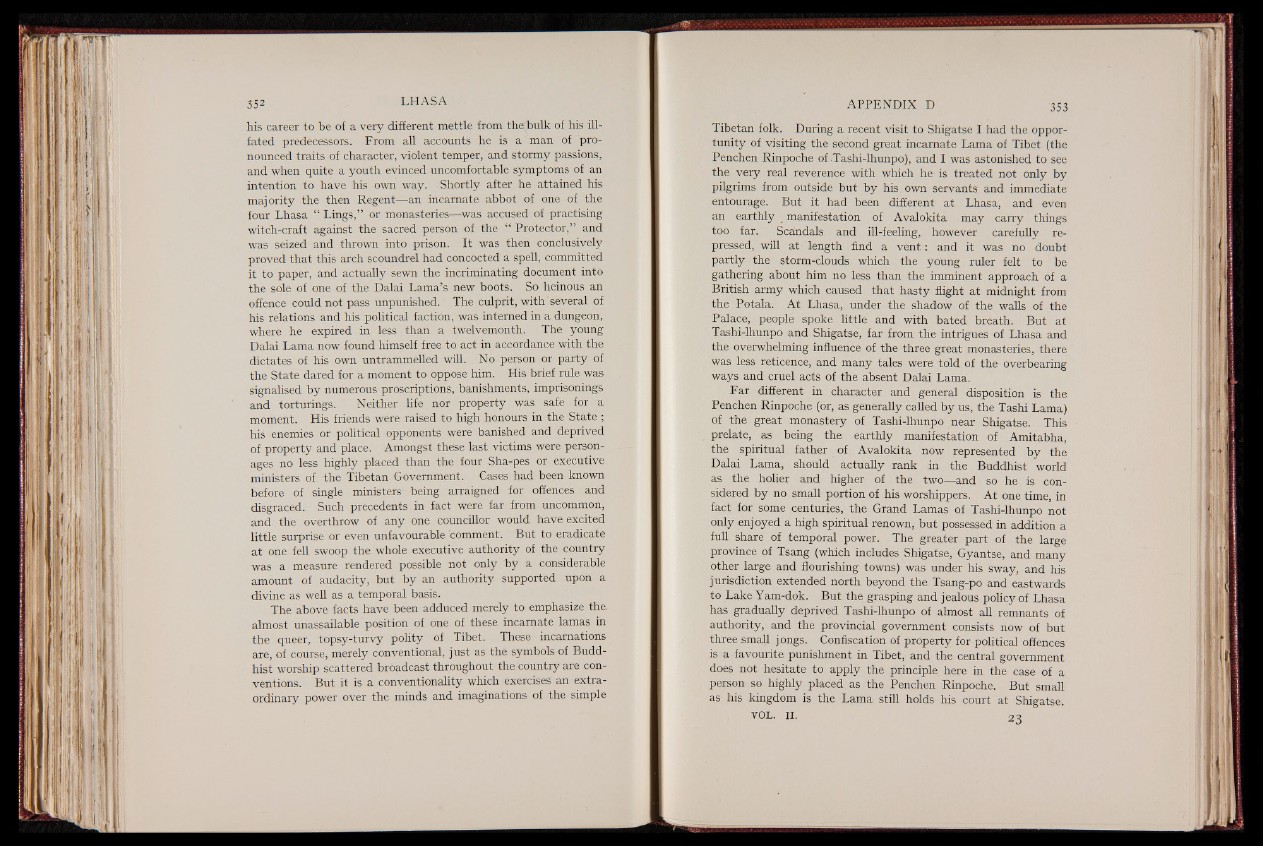
his career to be of a very different mettle from the bulk of his ill-
fated predecessors. From all accounts he is a man of pronounced
traits of character, violent temper, and stormy passions,
and when quite a youth evinced uncomfortable symptoms of an
intention to have his own way. * Shortly after he attained his
majority the then Regent— an incarnate abbot of one of the
four Lhasa “ Lings,” or monasteries— was accused of practising
witch-craft against the sacred person of the “ Protector,” and
was seized and thrown into prison. It was then conclusively
proved that this arch scoundrel had concocted a spell, committed
it to paper, and actually sewn the incriminating document into
the sole of one of the Dalai Lama’s new boots. So heinous an
offence could not pass unpunished. The culprit, with several of
his relations and his political faction, was interned in a dungeon,
where he expired in less than a twelvemonth. The young
Dalai Lama now found himself free to act in accordance with the
dictates of his own untrammelled will. No person or party of
the State dared for a moment to oppose him. His brief rule was
signalised by numerous proscriptions, banishments, imprisonings
and torturings. Neither life nor property was safe for a
moment. His friends were raised to high honours in the State ;
his enemies or political opponents were banished and deprived
of property and place. Amongst these last victims were personages
no less highly placed than the four Sha-pes or executive
ministers of the Tibetan Government. Cases had been known
before of single ministers- being arraigned for offences and
disgraced. Such precedents in fact were far from uncommon,
and the overthrow of any one councillor would have excited
little surprise or even unfavourable 'comment. But to eradicate
at one fell swoop the whole executive authority of the country
was a measure rendered possible not only by a considerable
amount of audacity, but by an authority- supported upon a
divine as well as a temporal basis.
The above facts have been adduced merely to emphasize the.
almost unassailable position of one of these incarnate lamas in
the queer, topsy-turvy polity of Tibet. These incarnations
are, of course, merely conventional, just as the symbols of Buddhist
worship scattered broadcast throughout the country are conventions.
But it is a conventionality which exercises an extraordinary
power over the minds and imaginations of the simple
A P P E N D I X D 353
Tibetan folk. During a recent visit to Shigatse I had the opportunity
of visiting the second great incarnate Lama of Tibet (the
Penchen Rinpoche of .Tashi-lhunpo), and I was astonished to see
the very real reverence with which he is treated not only by
pilgrims from outside but by his own servants and immediate
entourage. But it had been different at Lhasa, and even
an earthly _ manifestation of Avalokita may carry things
too far. Scandals and ill-feeling, however carefully repressed,
will at length find a v e n t : and it was no doubt
partly the storm-clouds which the young ruler felt to be
gathering about him no less than the imminent approach of a
British army which caused that hasty flight at midnigh t from
the Potala. At Lhasa, under the shadow of the walls of the
Palace, people spoke little and with bated breath. But at
Tashi-lhunpo and Shigatse, far from the intrigues of Lhasa and
the overwhelming influence of the three great monasteries, there
was less reticence, and many tales were told of the overbearing
ways and cruel acts of the absent Dalai Lama.
Far different in character and general disposition is the
Penchen Rinpoche (or, as generally called by us, the Tashi Lama)
of the great monastery of Tashi-lhunpo near Shigatse. This
prelate, as being the earthly manifestation of Amitabha,
the spiritual father of Avalokita now represented by the
Dalai Lama, should actually rank in the Buddhist world
as the holier and higher of the two— and so he is considered
by no small portion of his worshippers. At one time, in
fact for some centuries, the Grand Lamas of Tashi-lhunpo not
only enjoyed a high spiritual renown, but possessed in addition a
full share of temporal power. The greater part of the large
province of Tsang (which includes Shigatse, Gyantse, and many
other large and flourishing towns) was under his sway, and his
jurisdiction extended north beyond the Tsang-po and eastwards
to Lake Yam-dok. But the grasping and jealous policy of Lhasa
has gradually deprived Tashi-lhunpo of almost all remnants of
authority, and the provincial government consists now of but
three small jongs. Confiscation of property for political offences
is a favourite punishment in Tibet, and the central government
does not hesitate to apply the principle here in the case of a
person so highly placed as the Penchen Rinpoche. But small
as his kingdom is the Lama still holds his court at Shigatse.